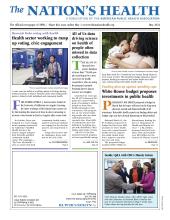
Photo by Xavierarnau, courtesy iStockphoto
Menopause. In the past, just hearing the word made some people cringe. But negativity around this time in a woman’s life is fading as more women speak up about it and celebrate what’s ahead.
Once they’re past menopause — which brings an end to child-bearing years— research shows women usually feel much better about their lives. They tend to be more positive about the future, feel more independent and have better relationships with their partners and friends.
In short, more women are seeing menopause as a positive change. And they’re not being shy about discussing it, including ways to manage the possible side effects of the transition.
“The baby boom generation was probably less willing to talk about private matters like menstruation, lactation or menopause,” says Stephanie Faubion, MD, MBA, medical director of The Menopause Society. “But there were fewer solutions for symptom management. Now we have Gen Xers, and the first millennials are turning 42, and they’re simply not willing to remain quiet.”
According to the National Institute on Aging, menopause is a point in time 12 months after a woman’s last menstrual period. The years leading up to that point are called “perimenopause.” That’s when women are likely to have symptoms such as hot flashes, mood swings, night sweats or brain fog, which come from fluctuating levels of body hormones.
Perimenopause usually begins between the ages of 45 and 55 and lasts about seven years. The average age of menopause is 51, but it can actually happen any time from the 30s to later.
More than 2 million women reach the menopause milestone each year, but the path there affects each woman differently.
Beyond hormonal changes, the menopause transition can raise risk factors for heart disease, Faubion notes.
“Menopause is a great time to reassess your overall cardiovascular disease risk, and that means knowing your numbers like blood pressure, cholesterol and sugar, but also paying attention to your weight, paying attention to your mood, which has an influence on heart disease risk, managing stress and getting adequate sleep,” Faubion says.
If you’re experiencing symptoms of peri- menopause, know that you’re not alone, and there are ways to relieve it. Steer away from possibly risky products hyped online and make an appointment with your health team to talk about things like prescription drugs, diet, stress reduction and other ways to cope.
Embrace the future
Although it impacts half the population, menopause has long been treated like an elephant in the room — there but not discussed.
Nowadays, health care providers are starting to address the topic more with their patients, says Leah Millheiser, MD, a clinical professor of obstetrics and gynecology at Stanford Medicine.
“I’ve never had this many patients on my roster who are being seen for menopause, which is incredible,” Millheiser says. “It’s such a joy. I feel like I’m having a renaissance in my work life because I’m finally seeing so many of these patients.”
Every woman will have a different experience with menopause. About 20% of women won’t have hot flashes and night sweats and might coast through with no problems. For others, menopause can be very distressing.
If you happen to be one of the millions of women going through menopause right now and struggling with symptoms, keep in mind they’ll soon be replaced with:
Freedom: You’ll no longer have to worry about periods, unwanted pregnancy or menstrual-related headaches. And all that money you’ve been spending on sanitary items can be used elsewhere.
Confidence: At midlife, your experiences and skills make you an important contributor to the workplace.
Independence: At midlife, many women have reached the empty nest stage and can now focus on doing the things they want to do, rather than having to attend to the needs of others. This is a good time to do something you never had time for.
Clarity: The brain fog associated with menopause will lift, leaving you with the ability to focus more sharply on the important things you want to accomplish now that you’re able to enjoy this second act of your life.
“We have finally come to a time in our history when we’re starting to see midlife women being celebrated for their knowledge, for their experience, for their confidence, for their strength, for what they bring to the table,” Millheiser says. “And I love the fact that we are talking about it.”
- Copyright The Nation’s Health, American Public Health Association









